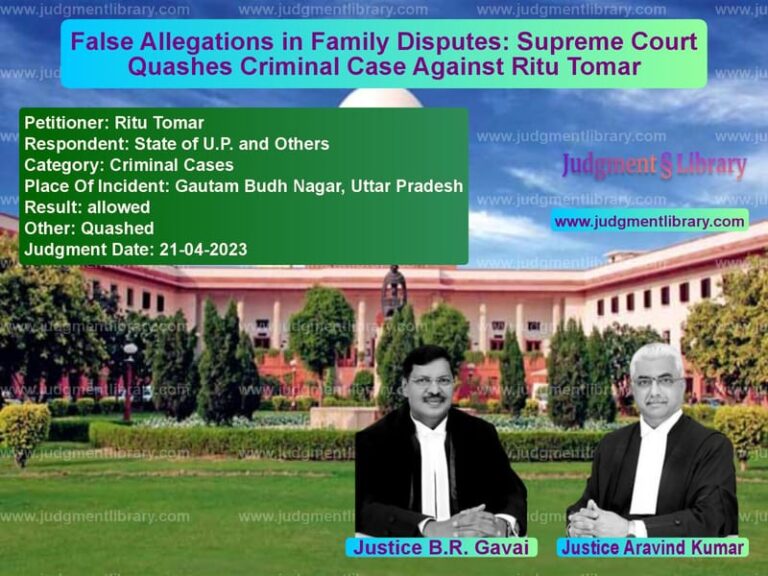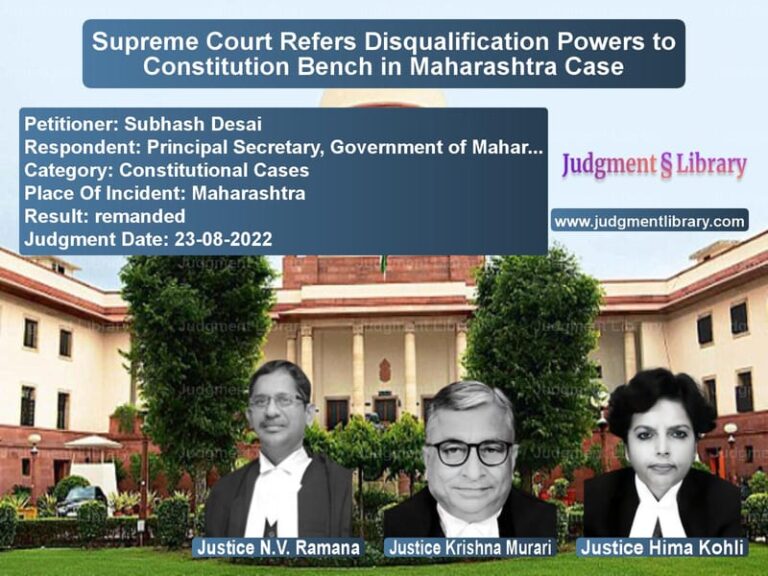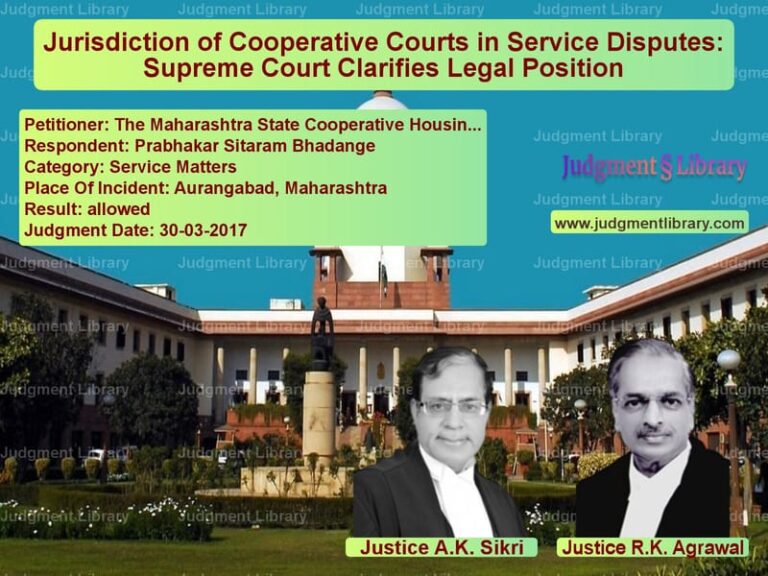Illegal Property Exchange in Educational Trust: Supreme Court Quashes Fraudulent Land Transfer
The Supreme Court of India, in the case of Randhir Kaur (Deceased) through her LRs vs. Balwinder Kaur & Others, ruled on a significant property dispute involving the illegal exchange of school land. The case concerned the fraudulent transfer of a property donated for educational purposes, which was later exchanged in an unauthorized transaction. The Supreme Court quashed the exchange and directed the revenue authorities to restore the land to its rightful owner.
The ruling is crucial as it reinforces the protection of charitable donations meant for educational institutions and prevents unauthorized property transactions by individuals entrusted with managing such assets.
Background of the Case
The dispute arose when the predecessor-in-title, Smt. Randhir Kaur, donated 4 Kanals 10 Marlas of land through a registered Gift Deed dated May 27, 1981, to Doaba Public School, Garhshankar. The gift was specifically for the advancement of education in the region and was legally transferred to the school. The school was run by the Doaba Education Society.
However, in 1988, the school’s principal, Balwant Singh, along with the president of the Doaba Education Society, entered into an oral exchange agreement with the intent of swapping the school’s land with another property owned by Balwant Singh in Village Khanni. This land exchange, executed through an agreement dated August 25, 1988, led to the mutation of the land in Balwant Singh’s name. Following Balwant Singh’s death in 1995, the land passed to his widow, Balwinder Kaur, who claimed ownership of the property.
Legal Issues in the Case
The Supreme Court addressed several key legal issues:
- Was the exchange of school land legally authorized by the Doaba Education Society?
- Did the Principal and President of the Society have the power to transfer land belonging to the school?
- Was the oral exchange valid, considering it was done without formal resolutions?
- Did the respondents have the right to claim ownership over the school’s donated property?
Arguments by the Appellants (Legal Representatives of Randhir Kaur)
The appellants contended:
- The land was donated for educational purposes and should not have been exchanged.
- The exchange transaction was fraudulent and unauthorized, executed without the approval of the Doaba Education Society.
- The exchanged land in Village Khanni was of inferior quality and unsuitable for educational purposes.
- The principal’s motive was personal gain rather than the benefit of the school.
Arguments by the Respondents (Balwinder Kaur & Others)
The respondents countered:
- The Gift Deed of 1981 did not include any restriction on land exchange.
- The school needed land in Village Khanni to serve students in remote areas.
- The land exchange was conducted for the benefit of the school and not for personal gain.
- The donor’s legal representatives had no standing to challenge the transaction since the donation had already been completed.
Supreme Court’s Key Observations
The Supreme Court analyzed the evidence, including the original Gift Deed, the alleged oral exchange agreement, and the actions of the school administration.
1. The Land Exchange Was Unauthorized
- The Court found that the Doaba Education Society had never passed a resolution approving the land exchange.
- The principal and president acted without authority and could not legally transfer school property.
2. The Exchange Benefited the Principal, Not the School
- The exchanged land in Village Khanni was of poor quality, and the school never relocated there.
- The principal transferred ownership of the school’s land to himself and then leased it back to the school.
3. The Fraudulent Mutation Was Invalid
- The mutation of the land into Balwant Singh’s name was illegal and void.
- The school’s land could not have been transferred without a valid written agreement and approval from the education society.
Final Judgment
The Supreme Court ruled:
- The oral exchange agreement of August 1, 1988, and the written agreement of August 25, 1988, were illegal and void.
- The mutation of the land in favor of Balwant Singh was quashed.
- The land should be restored to Doaba Public School, as originally intended.
- The respondents were directed to pay ₹1 lakh in costs to the appellants within 12 weeks.
Implications of the Judgment
This ruling has several important implications:
1. Protection of Donated Properties
- The decision ensures that properties donated for educational and charitable purposes are not misused.
- Future land transactions involving such properties must have proper authorization.
2. Prevention of Fraudulent Transactions
- The Court reaffirmed that unauthorized exchanges of property without proper resolutions will be declared null and void.
- It sets a strong precedent against self-serving actions by individuals entrusted with managing public assets.
3. Reinforcement of Legal Oversight in Educational Institutions
- The ruling underscores the need for educational societies to have transparent governance.
- Institutions must ensure that school property is used strictly for educational purposes.
Conclusion
The Supreme Court’s ruling in Randhir Kaur (Deceased) through her LRs vs. Balwinder Kaur & Others is a landmark decision in property law, particularly in protecting assets donated for educational purposes. The judgment prevents fraudulent transactions, restores the ownership of the school’s land, and ensures that donated properties serve their intended purpose.
This case serves as an important reminder that individuals in positions of authority cannot misuse public property for personal gain. The Court’s ruling strengthens legal protections for educational institutions and charitable donations, ensuring that future disputes over such assets are handled with strict legal scrutiny.
Petitioner Name: Randhir Kaur (Deceased) through her LRs.Respondent Name: Balwinder Kaur & Others.Judgment By: Justice Uday Umesh Lalit, Justice Indu Malhotra.Place Of Incident: Garhshankar, Punjab.Judgment Date: 06-05-2019.
Don’t miss out on the full details! Download the complete judgment in PDF format below and gain valuable insights instantly!
Download Judgment: Randhir Kaur (Deceas vs Balwinder Kaur & Oth Supreme Court of India Judgment Dated 06-05-2019.pdf
Direct Downlaod Judgment: Direct downlaod this Judgment
See all petitions in Property Disputes
See all petitions in Succession and Wills
See all petitions in Landlord-Tenant Disputes
See all petitions in Judgment by Uday Umesh Lalit
See all petitions in Judgment by Indu Malhotra
See all petitions in allowed
See all petitions in Quashed
See all petitions in supreme court of India judgments May 2019
See all petitions in 2019 judgments
See all posts in Civil Cases Category
See all allowed petitions in Civil Cases Category
See all Dismissed petitions in Civil Cases Category
See all partially allowed petitions in Civil Cases Category







